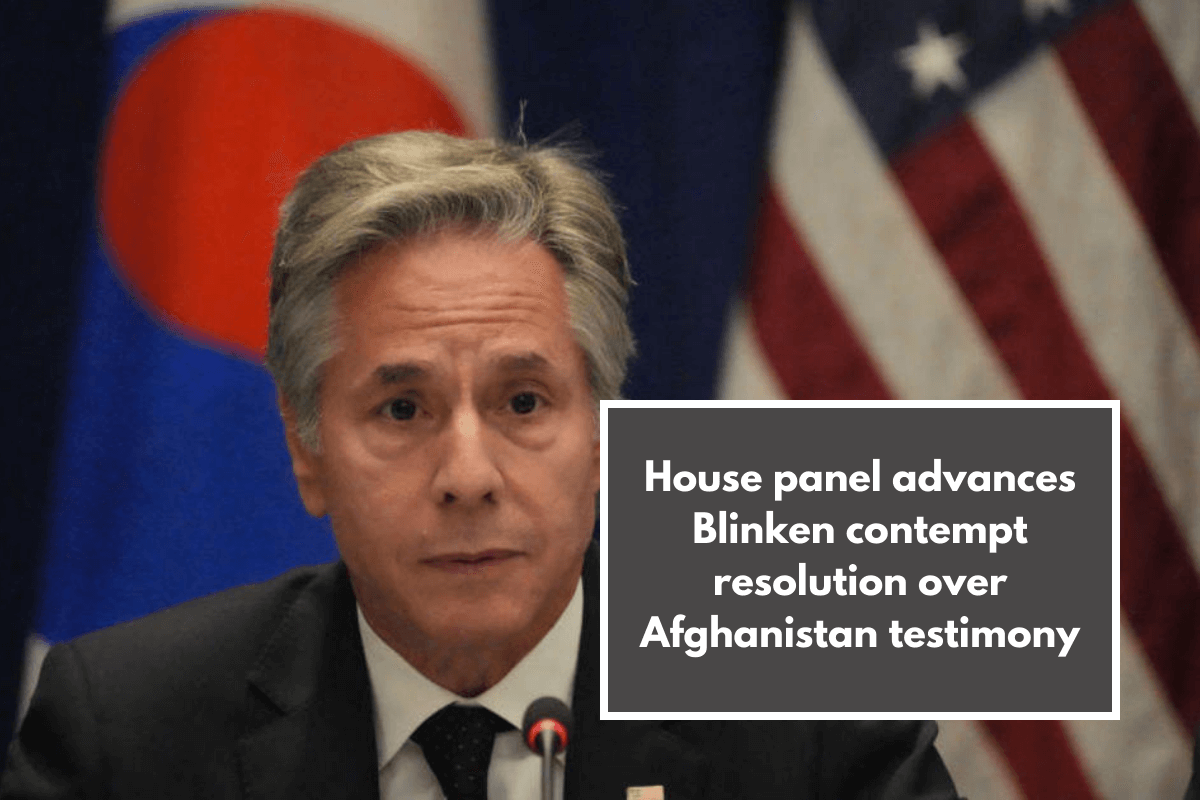Washington, DC — The House Foreign Affairs Committee, which is run by Republicans, voted Tuesday to suggest that Secretary of State Antony Blinken be held in contempt of Congress. This comes after a standoff over the top diplomat’s statement about the chaotic U.S. withdrawal from Afghanistan.
On Tuesday, the panel decided 26 to 25 along party lines to move the case forward. This meant that the resolution would now go to the House, where it would be the latest official rebuke by House Republicans of a top Biden administration official.
To send it to the Justice Department for prosecution, the whole House would still have to vote, and it’s not likely that Blinken would be charged by the Biden government.
Matthew Miller, a spokesman for the State Department, said in a statement that the vote was “really just a political stunt posing as oversight, meant to further the partisan interests of the majority while pretending to ask questions that have already been answered.”
A few hours before, Rep. Michael McCaul, the chairman of the committee, called for a short hearing and said that the goal was to “hear directly from Secretary Blinken” and get his opinion on the withdrawal from Afghanistan.
“Unfortunately, our witness, Secretary of State Antony Blinken is not present today,” McCaul said after a long pause. He then ended the meeting and said he would “begin the formal process of holding the secretary in contempt of Congress.”
Blinken “brought this upon himself,” the Texas Republican said, blaming him of hiding from the American people.
The ranking Democrat on the committee, Rep. Gregory Meeks of New York, called the action “a rushed vote” that “undermines the seriousness” of Congress’s power to hold officials in contempt.
“There is nothing in the way here,” Meeks said. “This is political theater.”
Blinken’s testimony
McCaul subpoenaed Blinken earlier this month for his testimony, threatening to hold him in contempt if he did not attend on Sept. 19. McCaul wrote that Blinken’s appearance was crucial as the committee evaluates “potential legislation aimed at helping prevent the catastrophic mistakes of the withdrawal.”
Due to his departure overseas to negotiate a cease-fire with Israel and Hamas, the State Department suggested other dates for Blinken to appear. It also offered to have Deputy Secretary of State Kurt Campbell testify if the committee was scheduled for last week.
“We continue to not understand why the committee has chosen to take this step,” Miller said Sept. 17, calling the markup “extraordinarily unnecessary and unproductive.”
In 14 congressional appearances, including four McCaul committee hearings, Blinken has testified regarding Afghanistan, Miller observed.
Committee spokesperson Emily Cassil accused the State Department of “in obfuscation and outright avoidance.”
McCaul postponed the panel meeting by five days and subpoenaed Blinken for Tuesday. Blinken is in New York City for the UN General Assembly and meetings with world leaders.
“Once again, they have unilaterally selected a date,” Miller said, adding that the committee knew Blinken’s itinerary. “It very much does not appear that they’re acting in good faith.”
Starting next week, Congress will be in recess until October, limiting Blinken’s testimony unless committee members return to Washington.
McCaul accused the secretary’s spokeswoman of misrepresenting Blinken’s testimony debate during Tuesday’s meeting.
Virginia Democrat Gerry Connolly termed the hearings “a real shameful moment for this committee.”
“I deeply regret that the majority would undertake this effort while the president and secretary of state are negotiating very delicate matters on our behalf — and on the behalf of world peace,” he said.
The Afghanistan withdrawal
The Republican majority’s report released earlier this month outlined the panel’s yearslong probe of the botched 2021 U.S. exit from Afghanistan and accused the Biden administration of misrepresenting the public.
The long report criticizes President Biden’s withdrawal from Afghanistan, saying he “prioritized politics and his personal legacy over America’s national security interests.” Military officials, national security advisers, and U.S. allies warned of the risks of drawing American forces down to zero.
A suicide attack in Kabul during the evacuation killed 13 U.S. service members.
This was one of Afghanistan’s worst days. In a Sept. 8 “Face the Nation” interview, McCaul suggested the State Department could have stopped it by following the evacuation plan.
The committee conducted 18 transcribed interviews with Biden administration officials and collected over 20,000 State Department documents, some subpoenaed. Blinken did not testify.
Democratic Foreign Affairs Committee members released a paper defending the Biden administration’s pullout management under rapidly shifting conditions. Meeks said Republicans took “particular pains to avoid facts involving former President Donald Trump.”
The Taliban and Trump agreed to withdraw U.S. forces by May 2021. The Doha Agreement required the Taliban to meet certain requirements before U.S. soldiers left Afghanistan.
Last year, the State Department released a partially declassified study criticizing the Trump and Biden administrations for “insufficient” exit planning.











Leave a Reply